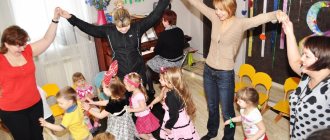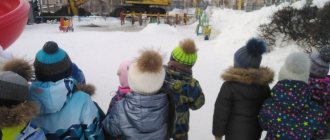Objective of the project:
- expand children's knowledge about plants such as flowers, trees, bushes, herbs.
- Exercise children in recognizing indoor plants by external signs using pictures with their images.
- Using role-playing games, show children clearly how to properly care for indoor plants.
- to form in children ideas about the adaptability of plants to changes in nature.
- introduce the children to different types of medicinal plants.
- cultivate a love for indoor plants, a desire to care for them, and the ability to communicate with nature as a living organism.
Final event: a lesson in the form of a conversation “Garden on the window”.
Directly – educational activities
Monday
1.Music (according to the music director’s plan)
2. Speech development.
Topic: “Introduction to the variety of words, modeling, drawing short, abrupt lines”
Goals: - to introduce children to the term “word”, as well as to the variety of words in the alphabet.
-develop hearing and perception of literary text, learn to select words that fit the meaning. consolidate the ability to correctly pronounce sounds in words.
/Kolesnikova E.V. Development of phonemic hearing in children. From 12-12/
3.H/T (drawing). Sketch “Vegetable garden on the windowsill.”
Objectives: - explain to children that you can draw not only with watercolors, but also with gouache, pastels, charcoal pencil and gel pen.
— help some children learn to hold a pencil correctly when drawing.
-learn to mix different colors with each other (gray-blue, green-yellow)
-develop the ability to independently choose colors for sketching plants.
Educational activities during restricted periods: group, subgroup
Morning.
- Work in a natural corner: water indoor plants, wash saucers;
- Wipe down the shelves, arranging plants on it.
Purpose: to provide the teacher with all possible assistance; bring your work to completion.
- Walk (3 weeks, card file No. 1)
Evening.
- Conversation - a story from a series of plot pictures.
Goal: to teach children to compose a story together with children, to give either humorous or appropriate names to the conversation. /Bondarenko T.M, p.40-41/
Educational activities during restricted periods: individual
Morning.
- Physical school
Goals: -to develop children's speech, coordination of hand and body movements, fine motor skills of the hands; development of voluntary attention and memory. ability to concentrate, with the help of which children can receive different impressions.
Evening.
- Educational game “Fourth odd” (cards, one at a time)
Goals: to develop children's thinking, coherent speech, attention; Expand words knowledge; teach children to establish the purpose and functions of objects, eliminating the unnecessary; establish a connection between an object and the benefits of its use.
Educational activities during restricted moments: independent activities of children
Morning.
- Working with plasticine.
Goals: to train children to work with it, consolidating the acquired skills; satisfy children’s desires to sculpt whatever they want of their choice; to consolidate in children the ability to sculpt objects in different ways, for example, plastic, constructive and combined; teach children to use a stack when modeling to make the task easier for them.
Evening.
- Offer blitz questions to the children one by one.
Goals: to conduct a conversation about politeness, the actions of people and their relationships.
Tuesday
1. Knowledge of FEMP. Topic: “Quantity and counting. Getting to know the number 1."
Goals: - consolidate children's knowledge about the number one.
- learn to compare objects by size (large, small, medium)
— continue to learn how to write the number 1 correctly.
/Kolesnikova E.V. Mathematics for children 5-6 years old. pp. 20-22/
2. C/T application “Dandelion”
Goal: - continue to improve children’s ability to convey images of objects in drawings.
- encourage the creation of subject and subject compositions, supplement them with details that enrich the images.
-develop the ability to sculpt small parts using a stack.
- consolidate the ability to sculpt from plasticine in different ways, smooth out shapes on cardboard.
3. Physical education lesson in the hall /according to the plan of the physical education director/
Educational activities during restricted periods: group, subgroup
Morning
- Enter a calendar indicating weeks, dates, months, and characteristic features of the day.
Goal: - to teach children to mark the day with the appropriate chip every day, so that in the future they can quickly master the days of the week and month.
- Walk (card file of walks No. 2)
Evening.
- Conversation about nature
Goals: - expand children’s understanding of living and inanimate nature; -explain to children that there are different types of plants: herbs, shrubs, trees. — discuss what types of indoor plants are found in a natural corner in our group.
Educational activities during restricted periods: individual
Morning
- Game "Guess the profession"
Objectives: discuss with children what professions exist, what people work in them and what is their labor material. — how professions are important in our lives, what is their role and significance in life / Dybina O.V., “Acquaintance with the subject and social environment. P. 60/
Evening
- Conversation about cultural and hygienic skills not only at home, but also in kindergarten
Purpose: -explain that you need to maintain order in your locker, so you need to be able to put your things neatly in a certain place.
Educational activities during restricted moments: independent activities of children
Morning
- Children's games with sets of animals from the group's collection
Goals: - to teach children to independently develop the plot, use existing knowledge about animals, and consolidate their names.
Evening
- Children's games with board games.
Goals: unite into subgroups based on interests; learn to develop the plot and bring the game you started to its logical conclusion. - children must learn to independently choose and organize games, and be able to coordinate their actions with each other.
Wednesday
1. Music lesson /according to the music director’s plan/
2. Cognition (formation of a holistic picture of the world) “About friendship and friends”
Goal: -expand knowledge about peers, consolidate the rules of friendly attitude towards each other;
-share a toy, talk to each other politely, if one of the children is sad, talk to him, invite him to the game, always help and help each other out. /Dybina O.V. “Acquaintance with the academic and social environment. pp. 25-26/
3. Artistic creativity. Handicraft/design on the theme “Plants”
Goal: - to consolidate the ability to cut paper into short long strips, cut circles from squares with scissors, create different compositions from shapes that were cut out.
- treat labor materials carefully and with care in order to use them in further classes.
Educational activities during restricted periods: group, subgroup
Morning.
- Conversation on the topic: “Where did we go on vacation in the summer?” We discuss situations in family life with children.
Goals: -continue to develop speech as a means of communication. Expand children's understanding of the diversity of the world around them. -encourage children’s attempts to share their impressions with the teacher and other children.
- Walk (card file No. 3)
Evening.
- Reading the story “Plant Dispute”
Goals: - continue to develop children’s interest in fiction, fairy tales, stories, poems. - children should listen carefully and interestedly to fairy tales, stories, poems; - to instill an interest in children learning to read as soon as possible in order to understand fairy tales and stories themselves.
Educational activities during restricted periods: individual
Morning.
- To develop cultural and hygienic skills in children.
Goal: explain to children that they should develop the habit of quickly and correctly washing their hands, wiping them dry with a towel and folding them.
Evening.
- Repeat forward and backward counting with children, as well as naming adjacent numbers.
Objectives: - practice composing problems, including all parts of the structure: conditions, question, solution, answer. -count with children to ten in forward and reverse order.
Educational activities during restricted moments: independent activities of children
Morning.
- Theatrical game "Family"
Goals: - continue to develop interest in theatrical play by involving children in play activities. make you want to try yourself in different roles during the game. - the teacher must create an atmosphere of trust in each other during the game, giving each child the opportunity to speak out about the children’s theatrical play during the game.
Evening
- Didactic game "Seasons"
Goal: - develop the ability to select pictures that correspond to each season and assemble a whole from parts.
Thursday
1. Knowledge of FEMP. Continue the lesson on the topic “Quantity and counting. Quantity Number. Orientation in time."
Goals: continue to get acquainted with the number one.
-the teacher explains the problem, and the children must solve it independently, without the help of the teacher.
- talk with children about the first autumn month - September.
-develop skills of self-control and self-esteem.
/Kolesnikova E.V. Mathematics for children 5-6 years old. pp. 20-22/
2. “Speech development.” Continue the topic of getting to know the variety of words.
Goal: - develop speech through dialogue
-if a child wants to express his point of view, then listen to whether you agree or not with his answer.
-children should develop the ability to talk about a subject according to a model, according to given pictures and actions that develop sequentially.
/Kolesnikova E.V. Development of phonemic hearing in children. From 12-12/
3. Outdoor physical education class /according to the plan of the physical education director/
Educational activities during restricted periods: group, subgroup
Morning.
- Riddles on the theme “Plant world”.
Goal: - teach to think logically and develop ideas; - development of the ability to analyze, generalize, forms the ability to independently draw conclusions, inferences, the ability to clearly identify the most characteristic, expressive features of an object or phenomenon, the ability to clearly and concisely convey images of objects, develops in children " a poetic view of reality."
- Walk (card file No. 4)
Evening.
- Game situation.
Strengthen spatial representations: left, right, up, down, in front, behind, between, next to, behind.
Educational activities during restricted periods: individual
Morning.
- Work individually with children on drawing round objects
Goal: learn to hold a pencil correctly, the ability to place objects in the center of a sheet, and overcome self-doubt.
Evening.
- Individual work on FEMP - name the geometric shapes that make up the rocket.
Objectives: - consolidate knowledge about geometric shapes, name them. -make a rocket out of flat geometric shapes. /Skorolupova. P.35/.
Educational activities during restricted moments: independent activities of children
Morning.
- Game of "Shop"
Goals: Children must independently perform actions regarding the role so that children can develop the plot of the game based on the knowledge they have acquired and observations from their lives.
Evening.
- Independent play activity.
Goals: children agree on the theme of the game independently; distribute roles, prepare the necessary conditions, children agree on a sequence of joint actions, establish and regulate relationships among themselves if disagreements suddenly occur, negotiate, reconcile, give in, convince; children learn to independently resolve conflicts that arise during play. Contribute to the strengthening of emerging sustainable children's play associations.
Friday
1. Physical education lesson in the hall (according to the plan of the physical education director)
2. Cognition (learning to read and write). Alphabet.
Goal: - the teacher introduces children to the alphabet, what words are made of, how to lay out words from sounds, change the first letter and learn new words, reading a poem in the game “Folds”. / Bondarenko T.M., “Practical material on the development of educational areas. pp. 115-117/
3. A lesson on cognitive research activities on the topic “Rules for caring for indoor plants.”
Goal: - the teacher continues to develop children’s speech as a means of communication.
-expand children's understanding of the diversity of the world around them.
- the teacher encourages attempts to share with other children their various impressions, where they learned about this information (TV show, an adult’s story, visiting an exhibition, children’s play, etc.).
-with children, consolidate the ability to carry out various tasks related to caring for animals and plants in a corner of nature; remind children to perform duty duties in a corner of nature (watering indoor plants, loosening the soil, etc.).
Educational activities during restricted periods: group, subgroup
Morning.
- Conversation on the topic “Phenomenon of Nature”
Goals: - tell what the weather is like in the morning, note its features in the nature calendar, and so on throughout the day, if there are changes.
- Walk (card file No. 5)
Evening.
- Exercise “Who hid on the feeding trough.”
Goals: - develop imagination, presentation, consolidate knowledge in naming birds, count them. Name the whole family, for example: goose - goose - goslings / Reent, P. 133 /
Educational activities during restricted periods: individual
Morning.
- Offer willing children a piece of paper and pencils.
Goal: - free drawing; -children should reflect in the drawing the most understandable and interesting episodes and explain their presence in the drawing.
Evening.
- Outdoor game "Running"
Purpose: - to introduce the game and its rules; -improve children’s ability to act on a signal by performing basic running movements. - formation of correct posture in children. -children learn to fairly evaluate the results of the game, who won and who lost.
Educational activities during restricted moments: independent activities of children
Morning.
- Children's games with any toys with their friends and girlfriends.
Goal: - with the help of the teacher, encourage children to become independent in the game. — children expand their gaming skills during the game. - the ability to exercise self-control is formed; -to develop leadership qualities and organizational skills among children (when working in pairs).
Evening.
- Jumping rope, twirling a hoop, ball games
Goals: develop physical qualities such as speed, strength, endurance, coordination.
Working with parents.
1. Individual conversation “How do you care for indoor plants in your family?”
2. Reading fiction with children on the topic “Plant world”.


